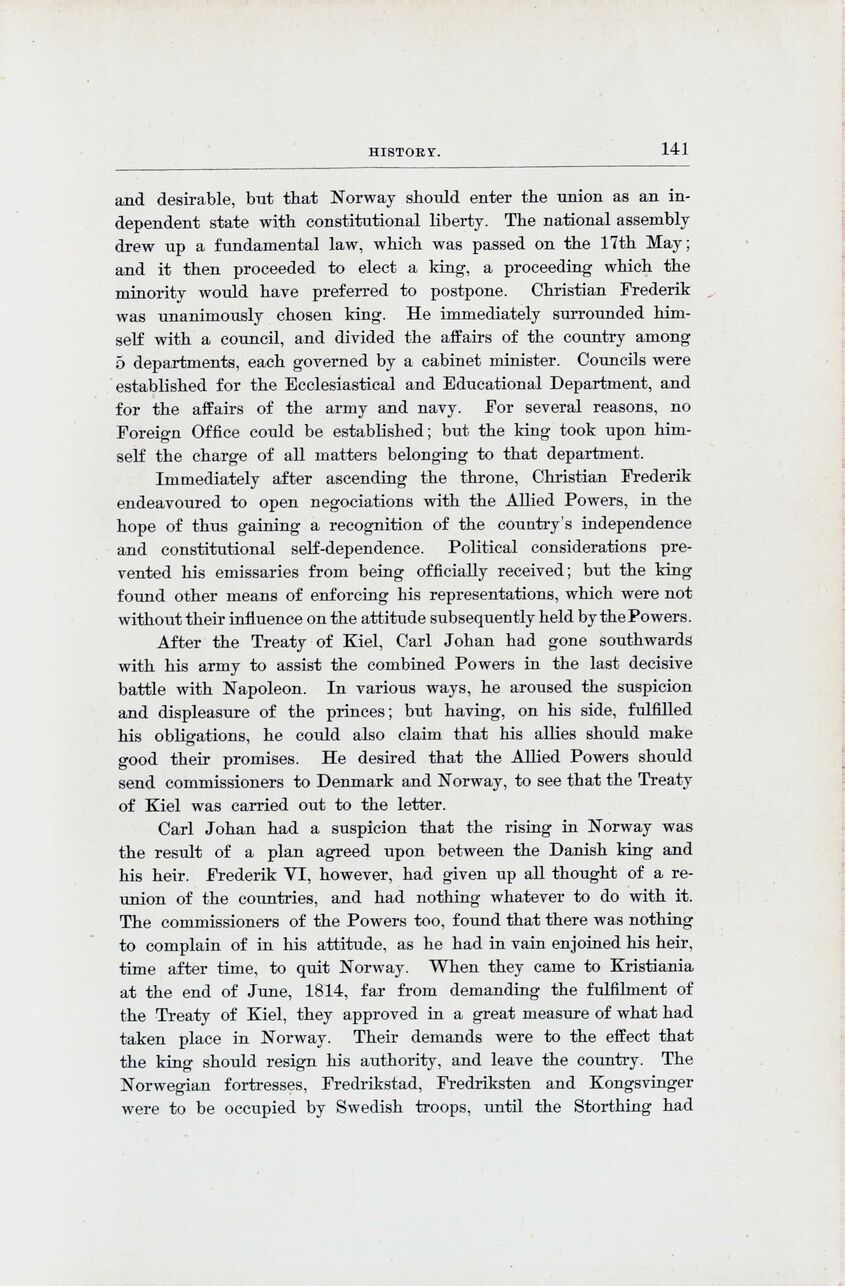
Full resolution (JPEG) - On this page / på denna sida - History, by O. A. Œverland

<< prev. page << föreg. sida << >> nästa sida >> next page >>
Below is the raw OCR text
from the above scanned image.
Do you see an error? Proofread the page now!
Här nedan syns maskintolkade texten från faksimilbilden ovan.
Ser du något fel? Korrekturläs sidan nu!
This page has been proofread at least once.
(diff)
(history)
Denna sida har korrekturlästs minst en gång.
(skillnad)
(historik)
and desirable, but that Norway should enter the union as an
independent state with constitutional liberty. The national assembly
drew up a fundamental law, which was passed on the 17th May;
and it then proceeded to elect a king, a proceeding which the
minority would have preferred to postpone. Christian Frederik
was unanimously chosen king. He immediately surrounded
himself with a council, and divided the affairs of the country among
5 departments, each governed by a cabinet minister. Councils were
established for the Ecclesiastical and Educational Department, and
for the affairs of the army and navy. For several reasons, no
Foreign Office could be established; but the king took upon
himself the charge of all matters belonging to that department.
Immediately after ascending the throne, Christian Frederik
endeavoured to open negociations with the Allied Powers, in the
hope of thus gaining a recognition of the country’s independence
and constitutional self-dependence. Political considerations
prevented his emissaries from being officially received; but the king
found other means of enforcing his representations, which were not
without their influence on the attitude subsequently held by the Powers.
After the Treaty of Kiel, Carl Johan had gone southwards
with his army to assist the combined Powers in the last decisive
battle with Napoleon. In various ways, he aroused the suspicion
and displeasure of the princes; but having, on his side, fulfilled
his obligations, he could also claim that his allies should make
good their promises. He desired that the Allied Powers should
send commissioners to Denmark and Norway, to see that the Treaty
of Kiel was carried out to the letter.
Carl Johan had a suspicion that the rising in Norway was
the result of a plan agreed upon between the Danish king and
his heir. Frederik VI, however, had given up all thought of a
reunion of the countries, and had nothing whatever to do with it.
The commissioners of the Powers too, found that there was nothing
to complain of in his attitude, as he had in vain enjoined his heir,
time after time, to quit Norway. When they came to Kristiania
at the end of June, 1814, far from demanding the fulfilment of
the Treaty of Kiel, they approved in a great measure of what had
taken place in Norway. Their demands were to the effect that
the king should resign his authority, and leave the country. The
Norwegian fortresses, Fredrikstad, Fredriksten and Kongsvinger
were to be occupied by Swedish troops, until the Storthing had
<< prev. page << föreg. sida << >> nästa sida >> next page >>